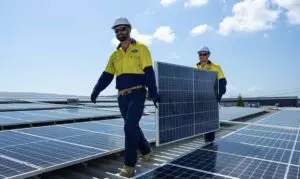 Tony Abbott has joined forces with his “like-minded” Canadian counterpart, Prime Minister Stephen Harper, to undermine the importance of united global efforts to tackle climate change, and disparage the use of carbon pricing as an economically damaging and environmentally inefficient mechanism.
Tony Abbott has joined forces with his “like-minded” Canadian counterpart, Prime Minister Stephen Harper, to undermine the importance of united global efforts to tackle climate change, and disparage the use of carbon pricing as an economically damaging and environmentally inefficient mechanism.
Speaking during his visit to Canada – or “Canadia”, as Abbott might say – the Australian Prime Minister described climate change as “not the only or even the most important problem” facing the world, and argued that each country “should take the action that it thinks is best to reduce emissions”.
To this end, Abbott claimed that the world was moving away from carbon trading schemes and towards Direct Action-based plans, like his own government’s, with its focus on energy efficiency, mobilising a Green Army and planting trees, while continuing to burn and export all the coal.
Speaking at a joint media conference in Ottawa on Monday, the two conservative leaders of fossil fuel resource-rich countries said they felt no pressure to change their approaches to climate change as a result of the US president Barack Obama’s newly proposed package to reduce emissions, and stressed the importance of putting their nations’ economic growth first.
“Stephen Harper and I are like-minded on this,’’ Abbott told reporters. “The argument is not about climate change — the argument is about the best means to respond to climate change and I believe that carbon taxes and emissions trading schemes are the wrong way to go.
“We should do what we reasonably can to limit emissions and avoid climate change – man-made climate change – but we shouldn’t clobber the economy. That’s why I’ve always been against a carbon tax or an emissions trading scheme because it harms our economy without necessarily helping the environment.”
Added Harper: “It’s not that we don’t seek to deal with climate change, but we seek to deal with it in a way that will protect and enhance our ability to create jobs and growth, not destroy jobs and growth in our countries.”
This, of course, is a direct contradiction of Abbott’s own past assessment of carbon pricing, and even of Obama’s own Direct Action plan. The “clobbering of the economy” line is taken up with gusto by vested interests and the right wing of US politics, even though economists such as Thomas Friedman point out the economic cost of more than $50 billion is just a fraction – one third of one per cent – of the US economy.
And, as the World Bank points out, carbon pricing is here to stay with more than 60 carbon pricing systems currently in operation or development globally, even in the world’s two largest economies and emitters, China and the US – and are not damaging to economic growth has been widely disputed.
Just last month, one of Australia’s leading economists, Ross Garnaut, said that the move to repeal the carbon price and replace it with an “ineffective” Emissions Reduction Fund did not make sense “to anyone who understands the implications of modern science on climate change” – while retaining it could address many of the nation’s budget issues.
“Retention of carbon pricing and rejection of the Government’s Emissions Reduction Fund would reduce the budget deficit by $6-7 billion in 2014-5, and a total of $6-12 billion in the following three years depending on the European Emissions Trading System’s carbon price,” Garnaut said.
“By coincidence, retention of carbon pricing would more or less precisely fill the gap from Senate rejection of some Budget measures.
“To put it another way, Australia can stay within the boundaries of fiscal responsibility over the next four years as defined by the Government in this year’s Budget by retaining carbon pricing rather than the array of changes that are at risk in the Senate.”
And in an Ernst & Young report set to be released later today, decarbonisation is pinpointed as an effective driver of economic recovery, as well as a powerful tool to reduce Europe’s energy import dependence.
In Australia, shadow environment minister Mark Butler has also contradicted Abbott’s claims on economic growth, arguing in radio interview today that “the surest way to destroy jobs and growth in the medium and long term is to do nothing about climate change.”
Butler also rubbished Abbott’s theory that the world was moving away from carbon trading: “I’m not sure where Tony Abbott gets this stuff from sometimes. …in actual fact the only country moving away from carbon trading schemes, moving backwards on climate change, is Australia. The rest of the world is moving forward in a way they never have before.”
Indeed, in February this year, China and the US jointly reaffirmed their commitment to contribute significantly to global efforts to meet the climate challenge.
“In light of the overwhelming scientific consensus on climate change and its worsening impacts, and the related issue of air pollution from burning fossil fuels, the United States and China recognise the urgent need for action to meet these twin challenges,” the countries said in a joint statement.
“As we work toward next year’s climate conference in Paris, we continue to urge all nations to join us in pursuit of an ambitious and inclusive global agreement that reduces greenhouse gas emissions through concrete actions,” they said.
In the US, in particular, the views of Abbott and Harper would seem to be much more in line with the country’s far right political contingent, represented by the likes of Florida Republican Jeff Miller, who on Monday said it was “foolish” to believe humans could cause global warming, and that the science was undecided.
Abbott – who was due to arrive in New York today – seems equally confused about this, however, describing Obama’s new push to make US coal-fired power stations cut emissions by 30 per cent by 2030, as “very similar” to his Direct Action approach, in using regulation to cut pollution and not carbon pricing.
But the bulk of Abbott’s comments from Canada put his political views in stark contrast to those of Barack Obama, who was quoted recently describing climate change as “one of the most significant long-term challenges, if not the most significant long-term challenge, that this country faces and that the planet faces.”
“Over the course of the next several decades, we’re going to have to build a ramp from how we currently use energy to where we need to use energy,” Obama said, according to interview highlights featured in Friedman’s opinion piece published in The New York Times on Sunday.
“And we’re not going to suddenly turn off a switch and suddenly we’re no longer using fossil fuels, but we have to use this time wisely, so that you have a tapering off of fossil fuels replaced by clean energy sources that are not releasing carbon.”
US officials have also been pushing Australia to include climate change on the G20 agenda, ahead of November’s Brisbane meeting. But before leaving Australia, Abbott said the G20 summit was primarily about economics and the United Nations was the place to discuss climate change.








